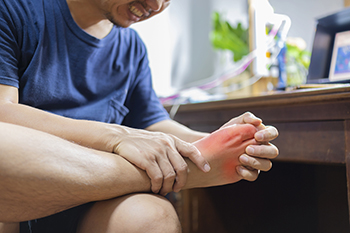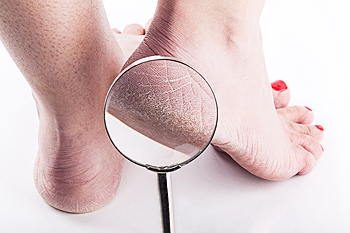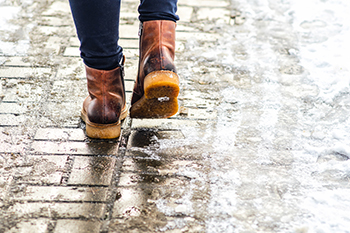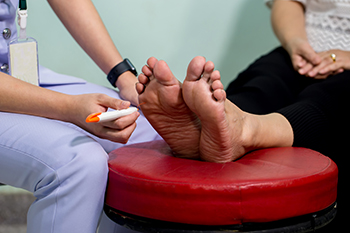

Gout is a form of arthritis that can strike suddenly and inflict excruciating pain on its victims. Recognizing the symptoms is key to understanding and managing this condition effectively. The most distinctive sign of gout is the sudden onset of intense joint pain, often in the big toe. This pain can be so severe that even the lightest touch can be unbearable. In addition to pain, gout can cause swelling, redness, and warmth in the affected joint. Gout attacks are frequently accompanied by a feeling of tenderness, and the affected area can become so sensitive that even the weight of a bedsheet can cause discomfort. Gout sufferers may also experience limited joint mobility during an attack. Beyond physical symptoms, gout can lead to a diminished quality of life, making it vital to spot and address its signs promptly to minimize its impact on daily activities and overall well-being. If you have symptoms of gout, it is suggested that you consult a podiatrist who can properly diagnose and help you to manage this painful condition.
Gout is a foot condition that requires certain treatment and care. If you are seeking treatment, contact Dr. Harris L. Klear from Burlington County Podiatry Associates. Our doctor will treat your foot and ankle needs.
What Is Gout?
Gout is a type of arthritis caused by a buildup of uric acid in the bloodstream. It often develops in the foot, especially the big toe area, although it can manifest in other parts of the body as well. Gout can make walking and standing very painful and is especially common in diabetics and the obese.
People typically get gout because of a poor diet. Genetic predisposition is also a factor. The children of parents who have had gout frequently have a chance of developing it themselves.
Gout can easily be identified by redness and inflammation of the big toe and the surrounding areas of the foot. Other symptoms include extreme fatigue, joint pain, and running high fevers. Sometimes corticosteroid drugs can be prescribed to treat gout, but the best way to combat this disease is to get more exercise and eat a better diet.
If you have any questions please feel free to contact one of our offices located in Marlton and Delran, NJ . We offer the newest diagnostic and treatment technologies for all your foot and ankle needs.

Cracked heels, a common foot condition, often result from dry and thickened skin surrounding the heel edge. While they may primarily affect appearance, they can lead to discomfort or pain and even severe issues, if left untreated. Cracked heels are often caused by dry skin, obesity, wearing poorly fitting shoes, or standing for extended periods of time. Certain conditions and risk factors may increase susceptibility. Women are more susceptible to this condition. Managing cracked heels involves actions that can include moisturizing, wearing 100 percent cotton socks, and gently rubbing thickened skin with a pumice stone. Medical treatments may be necessary for severe cases, including dead skin removal and antibiotic treatment for infections. If you have cracked heels and the condition is associated with a medical condition, or if they are persistent and severe, it is suggested that you schedule an appointment with a podiatrist for more professional guidance.
If the skin on your feet starts to crack, you may want to see a podiatrist to find treatment. If you have any concerns, contact Dr. Harris L. Klear from Burlington County Podiatry Associates. Our doctor can provide the care you need to keep you pain-free and on your feet.
Cracked Heels
It is important to moisturize your cracked heels in order to prevent pain, bleeding, and infection. The reason cracked heels form is because the skin on the foot is too dry to support the immense pressure placed on them. When the foot expands, the dry skin on the foot begins to split.
Ways to Help Heal Them
Ways to Prevent Cracked Heels
If you are unsure how to proceed in treating cracked heels, seek guidance from a podiatrist. Your doctor will help you with any questions or information you may need.
If you have any questions, please feel free to contact one of our offices located in Marlton and Delran, NJ . We offer the newest diagnostic and treatment technologies for all your foot care needs.

As the temperatures plummet and the outside environment becomes frosty, safeguarding your feet during outdoor work is paramount. Wearing proper footwear is the frontline defense against the biting cold. Choose insulated, waterproof boots that shield your feet from moisture and provide thermal protection. Layering socks is an effective strategy, ensuring warmth without compromising circulation. Choose moisture-wicking materials to prevent sweat accumulation, as dampness can intensify the cold. Additionally, ensure your boots are breathable to discourage moisture buildup. Regular breaks offer an opportunity to warm up and restore circulation. Invest in quality, insulated insoles to add an extra layer of warmth and comfort. Be mindful of frostbite warning signs, such as numbness or tingling, and promptly address any discomfort. Prioritize foot hygiene to prevent issues like frostbite and trench foot. If you are seeking additional tips on foot protection while working during the winter months, it is suggested that you confer with a podiatrist.
While working on the feet, it is important to take the proper care of them. For more information about working on your feet, contact Dr. Harris L. Klear from Burlington County Podiatry Associates. Our doctor will treat your foot and ankle needs.
Working on Your Feet
Standing on your feet for long periods of time can cause stress and pain in your feet. Your whole body may experience change in terms of posture, back pain, bunions, callouses and or plantar warts. There are ways to avoid these conditions with proper foot care, smart choices and correct posture.
Positive Changes
Negative heeled shoe – Choosing this shoe type places the heel slightly lower than the ball of the foot. These are great for overall foot health. Find shoes that fit you correctly.
Go barefoot – Our feet were not designed to be enclosed for all hours of the day. Try to periodically expose your feet to air.
Eliminate Pain
Foot Exercises – Performing simple exercises, incorporating yoga and doing stretches are beneficial. This will allow increased blood flow to the area and muscles of the foot.
Achilles tendon – Stretching the foot out flat on the floor will relax the calf muscles and tendon. These exercises can be performed almost anywhere. Make sure you add these exercises to your daily regimen.
With a little bit of this information and knowing more about foot health, you will notice changes. Foot stretches and proper footwear will help with pain and prevent further issues.
If you have any questions please feel free to contact one of our offices located in Marlton and Delran, NJ . We offer the newest diagnostic and treatment technologies for all your foot and ankle needs.

If you have diabetes, prioritizing your foot care plays an essential part in preventing serious complications. A diabetic foot care routine begins by inspecting your feet daily for any signs of trouble such as cuts, redness, swelling, sores, blisters, corns, or calluses. Wash your feet daily in warm water, using a mild soap. Ensure thorough drying, especially between the toes, to prevent moisture related issues. Avoid walking barefoot, even inside your home, to protect your feet from potential injuries and infections. Choose shoes that fit well and provide proper support and protection. Always wear socks to reduce friction and to help in keeping your feet dry. When it comes to toenail care, trim them straight across and smooth out sharp edges with a nail file. Avoid cutting too close to the skin to prevent ingrown toenails. Seek professional help for the removal of corns or calluses, as attempting to do it yourself may lead to complications. Incorporating these simple, yet effective, practices into your daily routine can significantly reduce the risk of foot complications associated with diabetes. Periodic monitoring from a podiatrist is essential to avoiding problems such as foot ulcers. If you have diabetes, regular visits to a podiatrists are recommended.
Diabetic foot care is important in preventing foot ailments such as ulcers. If you are suffering from diabetes or have any other concerns about your feet, contact Dr. Harris L. Klear from Burlington County Podiatry Associates. Our doctor can provide the care you need to keep you pain-free and on your feet.
Diabetic Foot Care
Diabetes affects millions of people every year. The condition can damage blood vessels in many parts of the body, especially the feet. Because of this, taking care of your feet is essential if you have diabetes, and having a podiatrist help monitor your foot health is highly recommended.
The Importance of Caring for Your Feet
Patients with diabetes should have their doctor monitor their blood levels, as blood sugar levels play such a huge role in diabetic care. Monitoring these levels on a regular basis is highly advised.
It is always best to inform your healthcare professional of any concerns you may have regarding your feet, especially for diabetic patients. Early treatment and routine foot examinations are keys to maintaining proper health, especially because severe complications can arise if proper treatment is not applied.
If you have any questions please feel free to contact one of our offices located in Marlton and Delran, NJ . We offer the newest diagnostic and treatment technologies for all your foot and ankle needs.